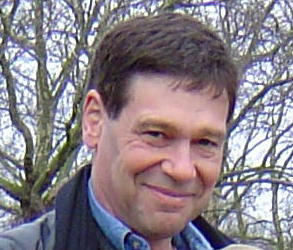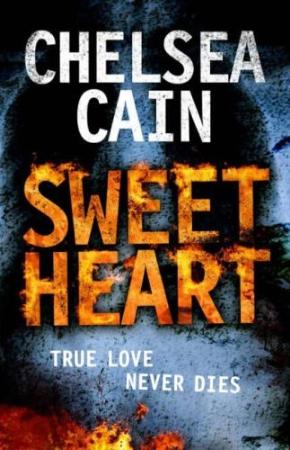THEY'RE LOVE STORIES. REALLY TWISTED LOVE STORIES... an interview with
Chelsea Cain
Woke up it was a Chelsea morning....I met Chelsea Cain in a Soho hotel,
which sounds more like Leonard Cohen than Joni Mitchell. Despite having
such a perfect name for the writer of fiction about a serial killer, she's
clean-scrubbed American, bright-eyed despite the jetlag accumulated on her
way from Portland, Oregon, and the perfect antidote to all those questions
she must get about writing such gruesome stuff ('No, I don't skin my
daughter's friends alive, dear.').
I had approached Cain's first two novels the way any cop in his right
mind might approach 'The Beauty Killer' Gretchen Lowell, with a certain
caution. Serial killers are as thick on the ground as serial parking
violators in crime fiction these days, and HEARTSICK draws rather openly
on some of the standard cliches of the genre, particularly from Thomas
Harris: the cop who caught the killer called out of retirement, the serial
killer incarcerated but still a major character, and even the killer
controlling his pursuer. But as I read I found myself drawn in by the
narrative drive, the humour, and the way in which Cain builds suspense by
using overlapping story lines, and lots of conflicts between the
characters. Her newsroom is as much a viper pit as the prison where
Gretchen is kept. And Archie Sheridan, the cop whom Gretchen tortured and
then saved, is one of the great conflicted heroes of our time. So much
more depth than Clarice being spoon-fed brains. SWEET HEART uses his
dilemma in a really creative way.
So I began by asking Chelsea if she worried about treading in familiar
(burial) ground?
CC: Well, it's a new take. I stopped trying to re-invent the wheel,
I indulge rather than avoid the archetypes of the genre. I think it's OK.
It shows I love these themes and characters.
MC: What I do think is new is the combination of humour, sometimes but
not always black, with the extremely graphic business of killing
Well, my proudest moment was the scene where she pulls out someone's
intestines with a crocheting hook. I can't believe I'm saying that! But I
hated crocheting!
In the second book, the character of Susan, the journalist, becomes more
central, and she provides much of the humour.
It helps break the tension, gives it punctuation and moments to
breathe. You can't be flippant about a serial killer. The challenge is to
make her likable-well, some people don't like her at all-but to make her
more likable, so I made her less flippant and gave her a crazy mom.
And if I did my homework right, you were a journalist and your mother
was a hippie?
Yes, I was the hippie kid, ostracised, but I got my revenge, because
Lowell, the name of my serial killer, was the name of my elementary
school.
And Gretchen is the ultimate school bully?
The ultimate high school mean girl.
What I like about Susan is the way she thinks she smarter than she is,
and the way she catches herself being manipulative without realising she's
being manipulated too.
Susan is my way into the story. I didn't have experience of serial
killers, but I know about being a journalist, and it helps to get some
reality into the story. You need the background details to be convincing,
not necessarily realistic but convincing, if you're going to go over the
top otherwise. Everyone's manipulative in the story, everyone's got their
own agenda.
There's a moment where Susan is dressing for an interview and she thinks
'something more intellectual. A sweater maybe.' which I found hilarious.
I thought it would play much funnier, but sometimes it gets lost in
the killing. But I needed her psychology to be a clue-her vainness,
immaturity, arrested development, whatever. She's a wisecracker...
Sort of like the classic hardboiled detective...
Yes, but her flaws have to be clues for Archie, and the After School
Strangler has to be at least 10% as interesting to him as Gretchen is.
Do you see yourself as part of a continuum of female writers in the
forensic branch, the Patricia Cornwell style of physical detail as much as
psychological?
Continuum implies an end! People do begin to become numbed to
detail, so the ante is up high, it's become a pop culture thing, and to
get to feel you must kick it up a notch. My writing is particularly
violent, but the thought is not to shock, although the opportunity is
there. Actually, the closest I get to 'literary' is when I describe the
corpse on the beach, all sombre grays.
Did you follow the Ian Rankin/Val McDermid controversy about
bloodthirsty women writers?
Oh yeah, it was good friendly publicity! But I am surprised at how
often reporters want me to justify the violence in my books, much moreso
than if I were a man. Then again, I've had women come up to me at readings
and say 'I think Gretchen's inspiring'.
Like a self-help book for Oprah's Book Club?
Well, I hope not! She' is a powerful counter to that archetype of
the female awed by the male character.
You also seem very much aware of the marketing here. Attractive woman
author, bloody serial killers. There's a moment in HEARTSICK where Susan
thinks 'If beauty sold books, then beautiful serial killers made
best-seller lists'. I laughed.
I'm fine with that! You know, I started out writing for fun, then I
thought OK I'll publish under a pseudonym, then OK I'll publish it, and
now this is what I want to do with the rest of my life!
There's another continuum here, the one where serial killers become
heroes, like Lecter or Dexter.
The power of Hannibal Lecter is that you root for him...
YOU root for him, maybe...
...because he's enigmatic, charismatic. In my third book the theme
is exploring the celebrity of violence. Serial killers have literally
hundreds of fan sites. I wanted to explore culturally how that happens,
how killers become heroes, and make the readers confront conflicting
emotions.
You do see Lecter as a hero?
You keep skipping to the sections of the book where he is. He's the
most interesting character. I mean, I write as an excuse to pursue
characters, their relationships, especially the one between Archie and
Gretchen. Everything else is just words.
You don't get to meet Gretchen until about two-thirds of the way through
HEARTSICK, and you do drive yourself toward it.
While I was writing to that scene I worried maybe it was too deep
into the book, but I found it easy to justify that. The Monster is only
scary for a minute, I got that message on a post-it note from a friend,
and I had to find a new way of maximising that scariness. I knew I needed
to put three in the room, Susan in there to observe, and she doesn't want
her to know she's scaring her.
Gretchen's not necessarily the most interesting character, though she
does respond to the spotlight. And of course she takes Susan apart and
good as solves the crime with one look at her...
Any good scene is about the tiny exchanges of power, and like I said
before, everyone's got their own agenda.
And Archie has three women trying to manipulate him. Is he a sort of a
homme fatale?
Maybe he is. Archie is a man who discovers he's not the man he
thought he was, and Susan discovers she's better than she thought she was.
Crossing arcs.
He's almost like one of those film noir bozos, especially in SWEETHEART,
where he believes he's a doomed lover. Gretchen's femme is literally
fatale.
Archie is a character defined by the women in his life, as a
character and as a narrative device. There is a tension, with Gretchen,
not knowing when each is fucking with the other. But since the female role
was traditionally passive, on the surface, the tension is increased.
Basically, at heart, these are love stories, just really twisted ones.
SWEETHEART
is published by Macmillan £12.99 hbk July 2008
Also by the author
Heartsick
|







